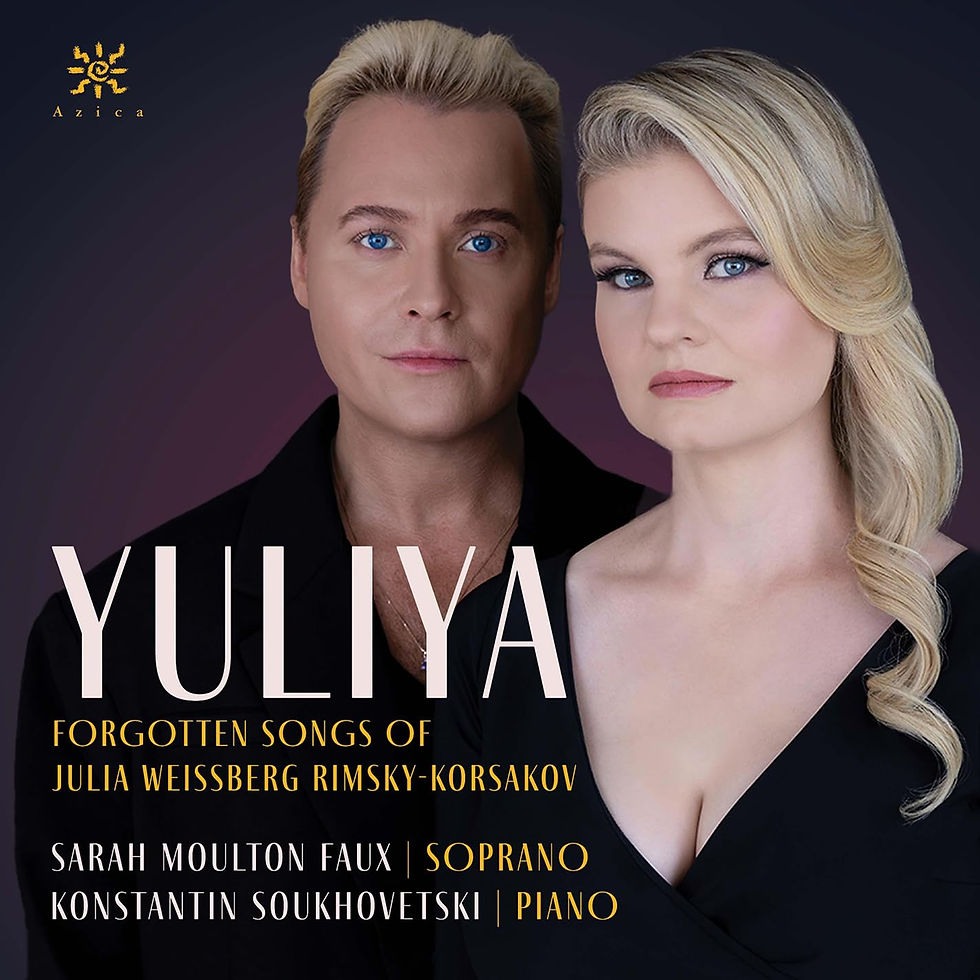Pianist Marika Bournaki: on a Schumanesque quest — finding herself in the process.
- Feb 5, 2011
- 4 min read
Updated: Jun 18, 2020
Marika Bournaki

It is easy enough to identify striking talent, even at a young age. For musically-talented performers, this often seems to set a process in motion that can lead to an unstoppable, out of control ride. Parental support and teachers’ ambitions frequently play into rising expectations and young performers are often left to fight for themselves, dealing with the stress of having to perform well at all times. Intensive training must conform to some of the highest and most competitive standards, but these are not often in sync with a teenage state of mind and can easily leave the budding artist feeling overwhelmed by an inescapable, spiraling wheel of critique and approval.
I wonder if this is how it sometimes appeared to the young, French-Canadian born Marika Bournaki, whom I met with her boyfriend, David Aladashvili, in November of 2008, at New York’s Juilliard School cafeteria. Marika generously shared with me her thoughts on the different stages and experiences of becoming the serious artist she set out to be. This has grown into a tender friendship over the past three years, where I have followed Marika, with a distinct appreciation of the interesting young woman and maturing artist she is becoming.

Marika’s promising pianistic talent had always created a lot of attention around her, making her what she describes as “the Golden child” of her piano teacher in Montreal. This renown gave her confidence and pride in her ability to perform, as well as lots of opportunities to do just that. Laughingly she described this as turning her into a bit of a “drama queen.”
Because she had experienced pain at the instrument, she sought out, even at 12, the help of Israeli born pianist and professor for music at the Juilliard School, Yoheved Kaplinsky. Veda, as she is affectionately called by her students, studied with Ilona Vincze-Kraus at the Israel Academy of Music and then under Irwin Freundlich at Juilliard, earning her Bachelor, Master and Doctoral degrees. She had also studied with Brooklyn-based pianist and teacher Dorothy Taubman, whose claim to fame lay in discovering an analytical approach that facilitates the physically complex elements in a natural piano technique; thus helping many pianists to overcome painful injuries or limitations and gain greater freedom and precise articulation within their playing. Since 1997 Kaplinsky had been appointed head of the Juilliard Piano College Division and Artistic Director of its Pre-College Division.

Marika flew down from Montreal weekly, when she was 12, to the Pre-College Division, and at fourteen began attending the Professional Children School in New York, while still studying with Kaplinsky.
Marika felt extremely lucky to have been accepted by Mrs. Kaplinsky, “since her hands were all messed up.” Mrs. Kaplinsky told her that she would not be able to play at all, if she did not undergo extensive retraining. Marika also had an overwhelming feeling of doubt which created a dilemma for her. At that time she was looking less for glamorous performance opportunities, but rather for stability, depth and security.
With some modesty, she also had to accept the fact that she was not the only talented performer around, and that her status of “child prodigy” was becoming a relative term. She was one of many, in a tense competitive environment; all of them gifted and eager to fulfill their legacy.
While a little dose of self- doubt probably effectively wards off a potentially exaggerated sense of self, it is equally important for a performer to enjoy the act of performing and … to be able to trust his or her ability to do so most efficiently.
The process of retraining one’s piano technique is not an easy task and Marika always felt, that she was a “ very emotional player, and, swept away by the music” she was playing. She had a difficult time concentrating on what it was she was doing technically, while playing.
However, “Something had to be right,” she admits smiling, as we continue one of our conversations , “something must have settled in,” since she now feels enabled, quite fluid and comfortable most of the time.

This year, Marika continues to get lessons from Kaplinsky, but another teacher, Matti Raekallio, has been added as a second teacher.
Marika has mixed feelings about that. While she enjoys a variety of input, she also worries about being exposed to confusing differences.
Of course we are only talking about nuances here. Marika sounds extremely proficient and most of the time creates very fresh, and at the same time, quite distinguished interpretations.
Her affecting cluelessness about her own pianistic prowess gives us some glimpses into a young artist’s soul-searching process. What possibly many young performers experience is still individually heartfelt and makes the sometimes glamorous seat at the piano a very lonely place to be, as well.
Since the filming began Marika has gained from a lot of personal experiences, allowing her to distance herself from the “Making Marika” process and, in turn, to be a bit more patient with her progress.

In the meantime, Marika even had the chance to meet her idol, pianist Martha Argerich, while chosen to participate at the 2009 Verbier Festival.
Marika’s website is: http://www.marikabournaki.com/ (See my article on David’s Aladashvili’s debut at Carnegie’s Weill Recital Hall http://getclassical.blogspot.com/2010/03/concert-review-david-aladashvili.html



Comments